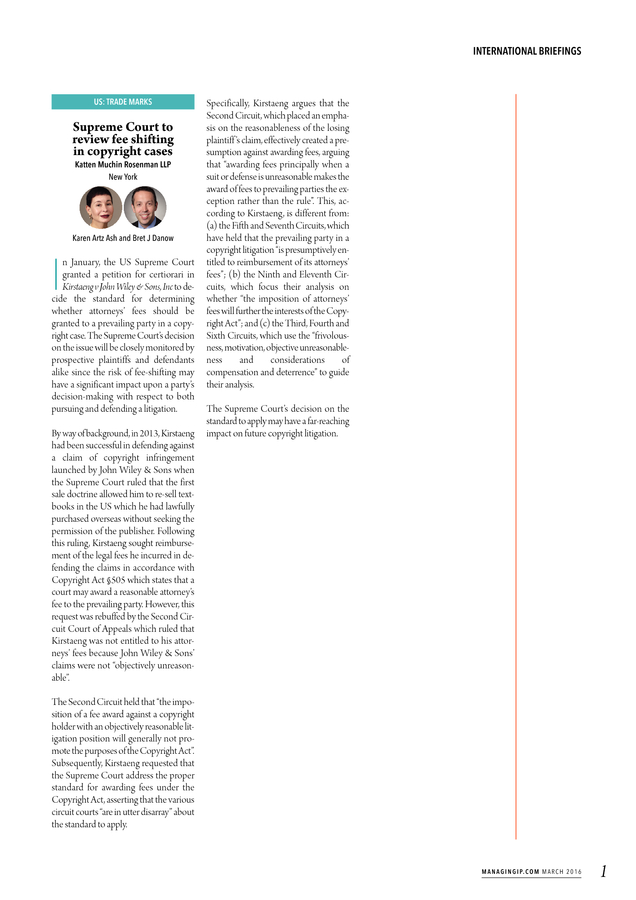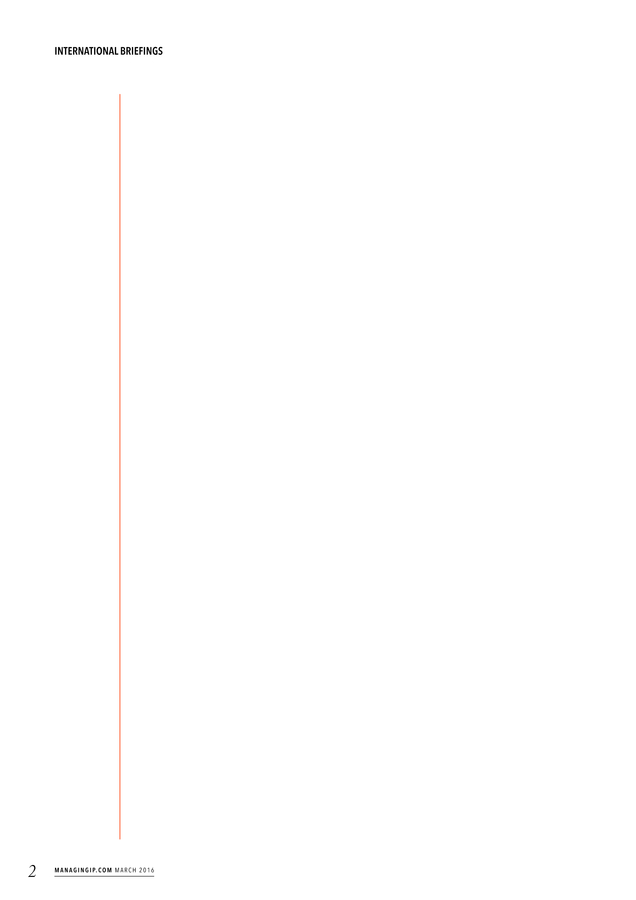Description
INTERNATIONAL BRIEFINGS
US: TRADE MARKS
Supreme Court to
review fee shifting
in copyright cases
Katten Muchin Rosenman LLP
New York
Karen Artz Ash and Bret J Danow
I
n January, the US Supreme Court
granted a petition for certiorari in
Kirstaeng v John Wiley & Sons, Inc to decide the standard for determining
whether attorneys’ fees should be
granted to a prevailing party in a copyright case. The Supreme Court’s decision
on the issue will be closely monitored by
prospective plaintiffs and defendants
alike since the risk of fee-shifting may
have a significant impact upon a party’s
decision-making with respect to both
pursuing and defending a litigation.
By way of background, in 2013, Kirstaeng
had been successful in defending against
a claim of copyright infringement
launched by John Wiley & Sons when
the Supreme Court ruled that the first
sale doctrine allowed him to re-sell textbooks in the US which he had lawfully
purchased overseas without seeking the
permission of the publisher. Following
this ruling, Kirstaeng sought reimbursement of the legal fees he incurred in defending the claims in accordance with
Copyright Act §505 which states that a
court may award a reasonable attorney’s
fee to the prevailing party. However, this
request was rebuffed by the Second Circuit Court of Appeals which ruled that
Kirstaeng was not entitled to his attorneys’ fees because John Wiley & Sons’
claims were not “objectively unreasonable”.
Specifically, Kirstaeng argues that the
Second Circuit, which placed an emphasis on the reasonableness of the losing
plaintiff ’s claim, effectively created a presumption against awarding fees, arguing
that “awarding fees principally when a
suit or defense is unreasonable makes the
award of fees to prevailing parties the exception rather than the rule”.
This, according to Kirstaeng, is different from: (a) the Fifth and Seventh Circuits, which have held that the prevailing party in a copyright litigation “is presumptively entitled to reimbursement of its attorneys’ fees”; (b) the Ninth and Eleventh Circuits, which focus their analysis on whether “the imposition of attorneys’ fees will further the interests of the Copyright Act”; and (c) the Third, Fourth and Sixth Circuits, which use the “frivolousness, motivation, objective unreasonableness and considerations of compensation and deterrence” to guide their analysis. The Supreme Court’s decision on the standard to apply may have a far-reaching impact on future copyright litigation. The Second Circuit held that “the imposition of a fee award against a copyright holder with an objectively reasonable litigation position will generally not promote the purposes of the Copyright Act”. Subsequently, Kirstaeng requested that the Supreme Court address the proper standard for awarding fees under the Copyright Act, asserting that the various circuit courts “are in utter disarray” about the standard to apply. M A N A G I N G I P. C O M M A R C H 2 0 1 6 1 . INTERNATIONAL BRIEFINGS 2 M A N A G I N G I P. C O M M A R C H 2 0 1 6 .
This, according to Kirstaeng, is different from: (a) the Fifth and Seventh Circuits, which have held that the prevailing party in a copyright litigation “is presumptively entitled to reimbursement of its attorneys’ fees”; (b) the Ninth and Eleventh Circuits, which focus their analysis on whether “the imposition of attorneys’ fees will further the interests of the Copyright Act”; and (c) the Third, Fourth and Sixth Circuits, which use the “frivolousness, motivation, objective unreasonableness and considerations of compensation and deterrence” to guide their analysis. The Supreme Court’s decision on the standard to apply may have a far-reaching impact on future copyright litigation. The Second Circuit held that “the imposition of a fee award against a copyright holder with an objectively reasonable litigation position will generally not promote the purposes of the Copyright Act”. Subsequently, Kirstaeng requested that the Supreme Court address the proper standard for awarding fees under the Copyright Act, asserting that the various circuit courts “are in utter disarray” about the standard to apply. M A N A G I N G I P. C O M M A R C H 2 0 1 6 1 . INTERNATIONAL BRIEFINGS 2 M A N A G I N G I P. C O M M A R C H 2 0 1 6 .













